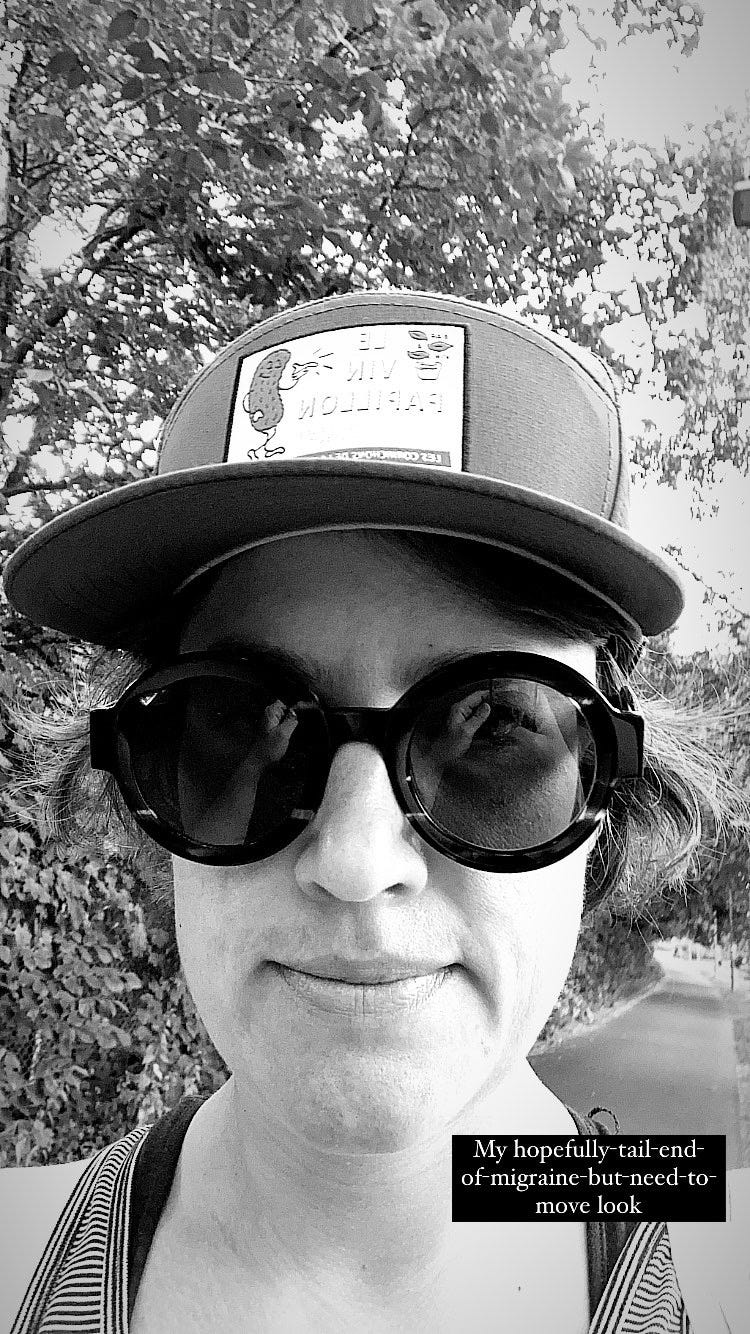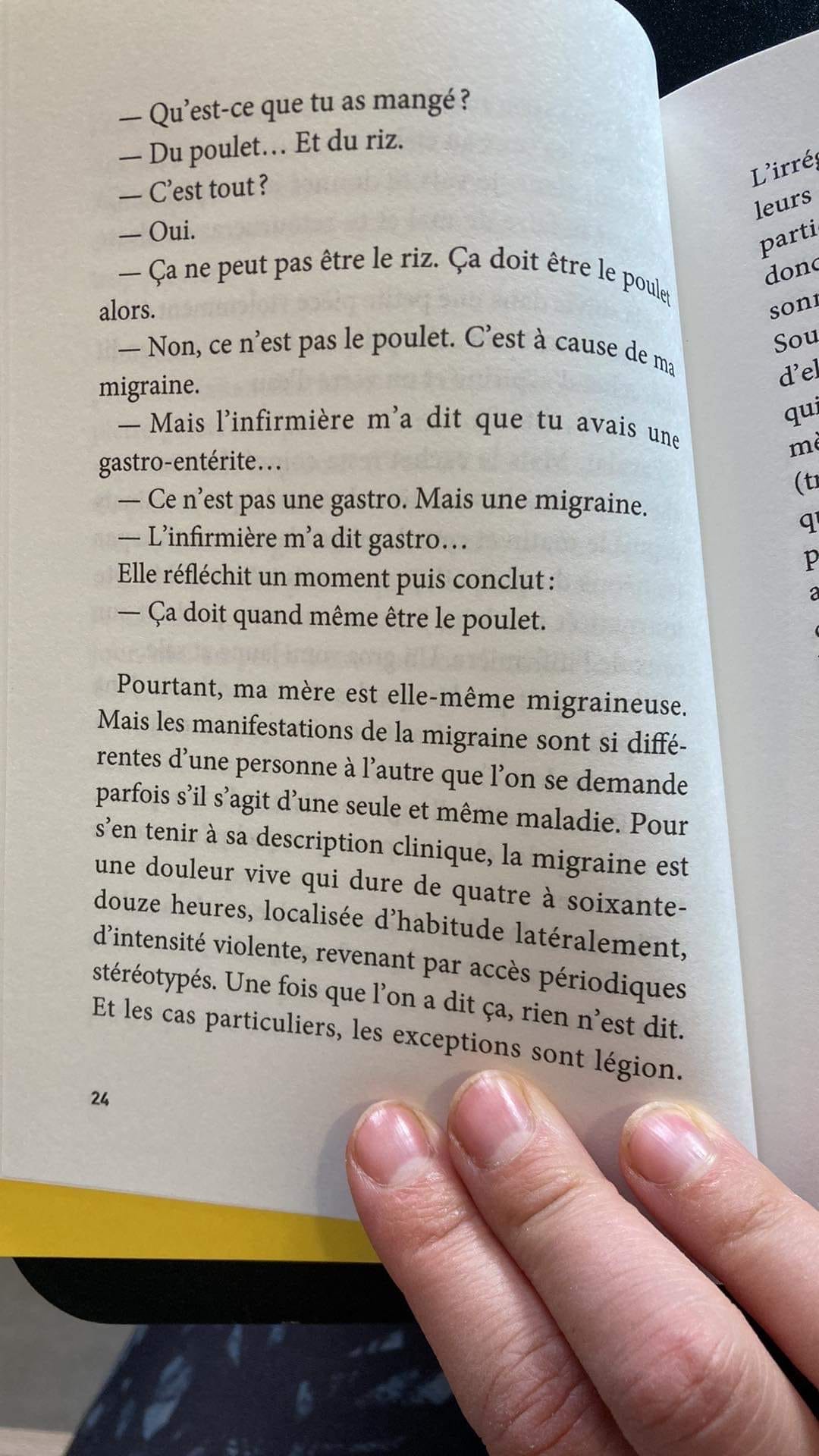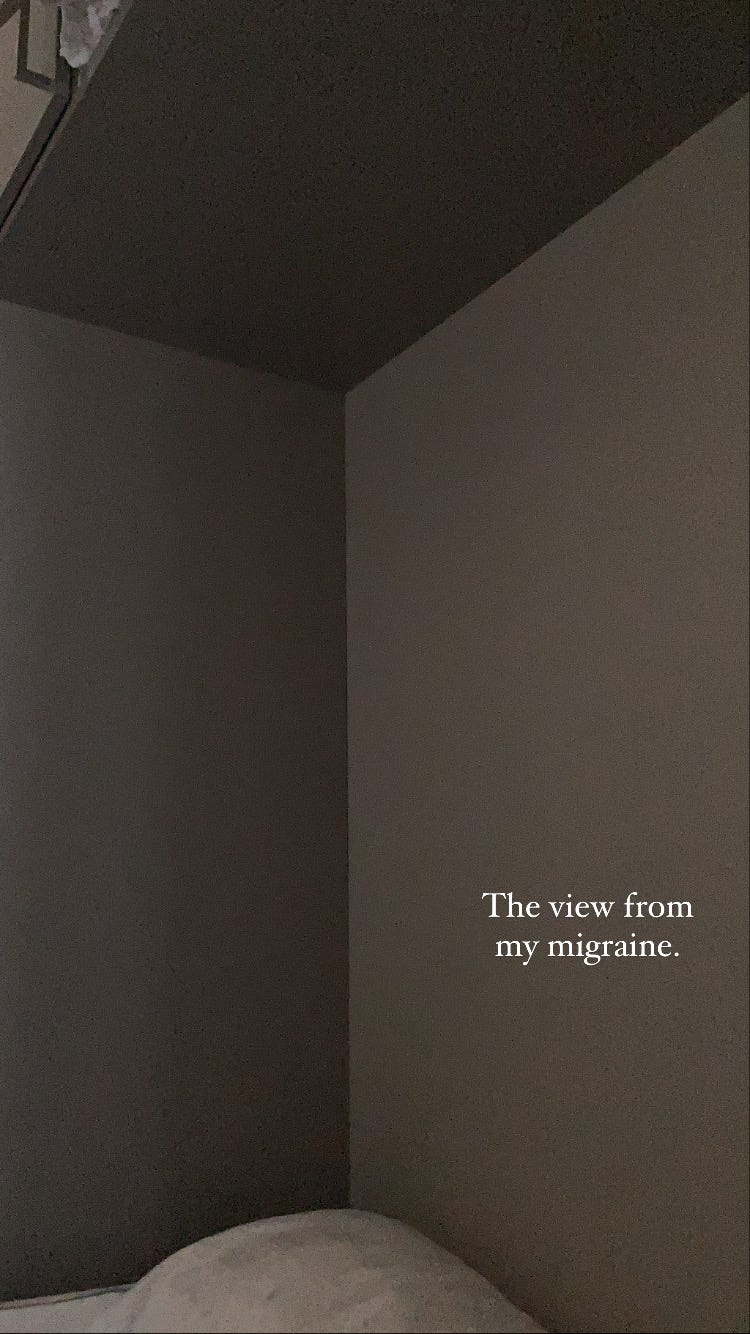On reluctantly learning to live with migraines.
Chronic illness sucks, as I am unfortunately finding out first hand.
This text, more than any other that’s appeared here thus far, is probably written for my own personal benefit rather than for an actual audience. You may have no interest in my migraines, and that’s okay. I’m tired of them, too. They may not make for very interesting reading, so feel free to skip. But if you do know people with migraines—and chances are that you do, since they’re pretty common, especially among women (hello, International Women’s Day!)—here is a helpful link from the Canadian Migraine Society for “friends and family” of migraine sufferers.
The real reason I’m spending three months in Lyon—beyond the fact that I like (love!) it here and try to spend as much time here as is practicable—is that I’m trying to not go crazy. My life has slowly been taken over by migraines, and I needed a break to try to find some kind of balance in my life and ideally fewer migraines. And until last fall, I had never actually had a bad migraine in Lyon, so I thought it might help.
Things have not worked out quite as I hoped. I had relatively few migraines during the first six weeks, but not none. And I recently seem to have fallen back into the black hole a bit. This past Friday, just before noon, I emerged from a three-day ordeal. It was my first three-day migraine in six months. It followed on the heels of two shorter ones, bringing my total for the week to at least 100 hours of migraines. I’m not sure how to even explain to someone who hasn’t tried how exhausting it is to spend 100 hours in pain which is unresponsive to painkillers, and with cognitive symptoms that make it almost impossible to interact with other people. Time moves very slowly. I listen to a lot of podcasts that I hardly remember afterwards. I think, from an evolutionary perspective, that we’re lucky not to actually remember pain very well once it’s gone. We’re relieved, and get on with it. We might fear its return, but without fully feeling what it would be like. I really had forgotten how awful it was to wait for three days for pain to end.
The strangeness of a migraine
I had my first migraine ten years ago, sitting in my office, writing my PhD dissertation. From one moment to the next, the letters on the screen stopped coalescing into words. I thought I was having a stroke, but my family doctor could reassure me that I was simply experiencing something a lot of women (especially) get to experience in their lives: a migraine. My vision would go strange, having me confused for a few minutes. I would blink repeatedly and try to find a blank wall to stare at. Was something off? The visual disturbances would eventually turn into glittering, zigzagging half-circles in my peripheral vision. After 30-60 minutes, a one-sided headache would set in. But if I took the relatively standard migraine attack medication which I was prescribed (generic sumatriptan) and went to bed, I would be fine—if perhaps a bit hungover—the next day. After five or six of these in quick succession, they stopped. My migraines settled into an unpredictable, but infrequent, schedule. I would perhaps have a few in the spring and a few in the fall, often around stressful events. Annoying, but by no means life-impairing.

The slow takeover
Over the past four years, my occasional migraines have transformed into something very different. In January 2019, I got the first one which was not preceded by an aura (the visual disturbances). That is, it arrived with no advance warning. When you don’t take migraine medication early enough, it doesn’t work. The sumatriptan which I took once the headache was unmistakeable did nothing. The migraine knocked me out for 72 hours. I feel pretty unfortunate to have 72-hour migraines, since this is really at the top end of the range:
Migraine is a genetic neurological disease that affects 1 billion people worldwide. Migraine includes a severe, throbbing or solid, intense headache, typically on one side of the head that lasts from 4–72 hours, is made worse by any movement or physical exertion, and is often accompanied by nausea, vomiting, light and sound sensitivity. (source)
Especially since my migraines do not respond to available medications against migraine attacks. Over the course of three years, I tried every attack medication (six different kinds of triptans, in the form of pills, nasal spray and injections), as well as pretty much all the first line preventive medications (several blood pressure medications, old school antidepressants, Botox injections. I refused the one that’s normally used for epilepsy and which I was terrified of after having seen it in action). The attack medications simply do not work, though one of them made day two and three of the attack slightly easier. (I’m not entirely sure if they could work better if I managed to take them at the right time, but it doesn’t seem like it. And in any case, I usually wake up in the night to find that the migraine headache is already there, at which point it’s too late to do anything). And the preventive medications really only gave me side effects. Painkillers, just to be clear, have absolutely no impact whatsoever on my migraines.
During this long period of trial and error, my three-day migraines (with a fourth “postdrome” day where I am still knocked out) have occurred with increasing frequency. First in clusters of three-four-five, forming a “really bad month”. But with several good, completely migraine-free, months in-between. But more recently, they have taken over my life entirely.
Chronic migraine
At the end of all of this, by January of 2022, I had tipped over into the chronic migraine diagnosis. This is a somewhat arbitrary cut-off, defined as having 15 headache days a month (of which eight are migraine days), over at least three months. I don’t actually have other kinds of headaches often, so in my case, I was having 15 migraine days. And by days, I mean 24 hours, not a five-hour migraine in the afternoon. Migraine-related symptoms half the time, in three-day increments. When you get this far, it means you can win a sort of prize: access to the expensive, new preventive medications known as CGRP inhibitors with coverage from the Norwegian health service. These have no side effects (for me), and involve a monthly self-injection.
I was incredibly hopeful, and to some extent I did finally get relief. Instead of three days in pain in bed, outside of time and space, the new medication brought my migraines down to around 24h, with reduced pain and barely any sensitivity to light. This allowed me to leave my bed and do simple activities. I could take basic care of myself, go for a walk, make dinner, have short conversations. I could mobilize to do a presentation or attend a meeting that couldn’t be moved, at least if I wasn’t too tired. (Though I increasingly think doing so is a terrible idea, which just gives me more migraines). For the first half of 2022, I didn’t have that many of them either, just a few strategically coinciding with key work events (I have been on live TV during a migraine and I DO NOT recommend). It was an immense relief to know, when I woke up with a migraine at 3 am, that it would be relatively mild and gone the next day. It also meant that my back wouldn’t seize up as often, since I could get out of bed and move around more.
But over the course of the second half of 2022, the attacks just became more and more frequent. For a while in September-October, I had daily ones, with a just a few hours of respite between them. It doesn’t help that they are shorter if I am getting a new one as soon as the previous one stops. In September, I had 16 migraine days. I am currently at 11 of the last 30. (I can’t help but wonder if it would have helped to get the medication that actually worked a bit sooner, but who knows.)
Losing one’s life of the mind
Everyone’s migraine is different. I don’t vomit, and I don’t get vertigo, thankfully. But I feel like I am outside time and space and like my brain doesn’t work. It’s like I am in a bell jar, cut off from the world. I can’t find words. I can’t think. I can’t really hold a conversation for very long, and certainly not with more than one person. Cognitive impairment is a real effect of migraines, and something that makes having a migraine extremely different from having “a headache”. It seems to be a symptom that medications can have less effect on that the actual pain (source). It’s the main symptom I am currently left with, along with one-sided pain that varies in strength, but is usually not too bad (though the most recent one was awful, and though the pain is sometimes located in my jaw so it feels like a toothache, but just impossible to stop with painkillers).
Cognitive impairment is, of course, a pretty difficult symptom to live with when your are living a life of the mind. My job is, essentially, to think and read and write—all the things that are impossible when I have a migraine, even a relatively mild one. And most things I like to do outside of work are out of the question as well—reading fiction, any kind of socializing, drinking wine, watching movies, most exercise (exercise worsens the pain, but I can do a bit of yoga and go walking). How do you maintain friendships, let alone relationships, if you can’t actually interact with other humans half the time?
On top of all of this, none of the usual migraine advice resonates. I sleep enough. There is zero correlation between my wine intake and my migraines (thankfully, on the one hand, but on the other hand that would have been an actual implementable fix!!). Sounds, noises, certain foods, not sleeping, barometric pressure—I have not identified a single thing that seems to correlate. The only so-called trigger I have ever been able to pinpoint is “stress”. What am I supposed to do about that? Beyond yoga, breathing exercises, already being a master planner, and not being a perfectionist? (I insist I am not, though people might disagree). And without auras to warn me, and migraines that most often begin when I sleep, there is no way to even try to medicate on time. You’ll sense my frustration.

Living with it?
I’ve talked to a few therapists over the past year, using different kinds of approaches. Because I somehow have to live with this, and because I have been getting more and more anxious, which I think is actually fueling the migraines. Either I have one, or I am worried about getting one, and the worry raises my stress levels, and then I get one, and so on. I have been so mad at the idea of “acceptance”, because I don’t WANT to accept a state of affairs where I am either scared of getting a migraine, in bed with a migraine or completely exhausted from having one. The situation I was in this fall was not a way to live—not compatible with either work or, frankly, normal human relationships.
Things are, generally, better than they were this fall. Yet another medication seems to have helped a bit. It’s indicated for both headache prevention and anxiety, but my dose is so low it is probably not responsible for my lower anxiety. So perhaps it’s actually working on the migraines, or perhaps therapy is getting somewhere. I have mostly good days, and I try to just let go of the other ones. I leave space and time for a little while, and then I come back. I read a quote the other day, by a fellow migraine sufferer, which I am starting to think is what I need to aspire to, as an attitude:
I've learned to look at migraine treatment as a journey in self-care rather than a search for a solution...I can accept that I suffer from migraines, or I can resist that fact and add to my suffering. I choose the former, because I can't change the fact I get migraines, but I do have control over how I think and act about that.
I have, after all, tried all the solutions currently on offer by conventional medicine in Norway, in addition to various non-conventional attempts (neuro-reflexology, acupuncture, various apps). At this point, the remaining options are probably illegal. (They might work, however—there are studies showing good effect of psilocybin).
A few ongoing clinical trials in Norway seem out of the question—one of them excludes me because I have tried too many other things (oh, come on), and the other requires me to stop taking the one thing that is currently working, the CGRP inhibitor, for five months before entering the study (which in itself involves botox injected directly into the brain via the nose…). There are new medications in the pipeline—gepants, for instance—but I need to wait for them to be approved in Norway, and them for them to be covered by the social security system, before I can see if they work. Fingers crossed.
All I can do in the meantime is try to keep as level a mind as possible, reducing external and internal sources of stress where I can. Try to not feel bad about cancelling things, which I just HATE doing. Try to rest when I need to. Try to not be hard on myself for whatever my brain won’t let me do anymore. I’m used to having a pretty good brain, after all, when it’s in working order. It seems I’ll have to enjoy it when I can, and otherwise give it the downtime it is demanding.
Dealing with someone with migraines
If you know someone who has migraines—or if you know me—you may struggle to understand what it’s like, or you may wonder what to do, or if you can help. One thing I don’t love is the innocuous and well-intended wish for a speedy recovery. The migraine takes the time it takes, there is nothing I can do to speed it up, it will be a full day, or sometimes even three. Time feels endless when I have a migraine. So I would love to hear something like “hang in there”, “courage”, or even “I hope tomorrow will be better” instead. And perhaps try to help me not feel bad about cancelling. I’ll have to cancel things, there is no way around it. I hate doing it, but I have to. Ask me if it’s really a good idea to go ahead anyway, if I try to, because it isn’t. If I actually have a migraine, the extent of socializing I can handle is a little walk with not too much talking, or maybe a visit for 15 minutes with takeout.
And, on a much more positive note, do spontaneous things with me! People aren’t so spontaneous anymore. Bring back the sudden text or, dare I say it, phone call (!!) about meeting up after work! If I have a good day, I’d love to. If I don’t, then I’ll be happy you thought of me.



"People aren’t so spontaneous anymore."
Yep. And it's killing me.
Thanks for this post. It helps to understand (& honestly, been wondering how you’re doing!) Happy to take a spontaneous walk or glass of wine when you’re back and feeling up for it.